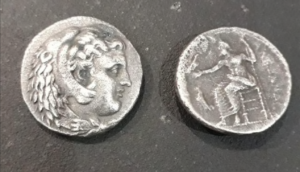
While inspecting a 40 yr-old Gazan entering Israel, 2 highly prized silver coins from the times of the final years of Alexander the Great’s conquests of our region, were confiscated.
– The apprehended smuggler from Gaza will now enjoy 24hr heating, 3 healthy meals served daily and a warm bed to sleep in each night for his 2 coins, until legal proceeding are complete, and he’s returned home.
By Itay Blumenthal, Yoav Zitun
Two ancient coins, originating from 325-323 BC, were discovered this week when a Palestinian man attempted to smuggle them into Israel from the Gaza Strip through the Erez Border Crossing.
The coins were detected when the man, a 40-year-old resident of the Gaza Strip, was stopped for a routine check at the Erez checkpoint.
The Archaeology Department of the Civil Administration seized the coins.

The 2 ancient silver coins confiscated from the Gaza smuggler. – Photo: IDF/COGAT
The coins are made of silver and are equivalent to the tetradrachm, an Ancient Greek silver coin. They were coined during the late days of Alexander the Great’s reign, or shortly after his death.
One was coined in Babylon—modern day Iraq—and the other in Amphipolis, an Athenian colony in modern day Greece. The two coins are highly prized and sought after and are of vast historical and cultural importance.
This isn’t the first attempt to smuggle coins into Israel from Gaza. In July 2017, a Palestinian man entering Israel was caught carrying four coins from the time of Alexander the Great.
Alexander the Great, 356-323 BC, was the King of Macedonia and is considered one of the greatest leaders in history. He conquered the land of Israel and Egypt without encountering any major resistance. He established a city named after him in Egypt—Alexandria—and then returned to Syria and Mesopotamia, where he famously beat the Persian King Darius in the battle of Gaugamela in 331 BC.

Alexander the Great, featureed in a Roman Era mosaic from the city of Pompeii. – Photo: Wikimedia Commons
During Alexander’s massive conquests in the east, he started seeing himself as a god rather than a king, and as a bridge between the east and the west.
He married Roxana, a Sogdian princess from Bactria, and tried to force his officers to marry local Persian noble women. Alexander’s officers felt uneasy about these demands, as they saw the peoples of the east as lesser, occupied peoples. Several of his officers were executed after they clashed with Alexander about the matter.
In 323 BC, at age 33, Alexander died of a fever, after conquering vast lands from Europe and all the way into India. His empire was split to three after he died and never returned to its former glory.
View original Ynet publication at:
https://www.ynetnews.com/articles/0,7340,L-5403710,00.html






 Israeli New Shekel Exchange Rate
Israeli New Shekel Exchange Rate